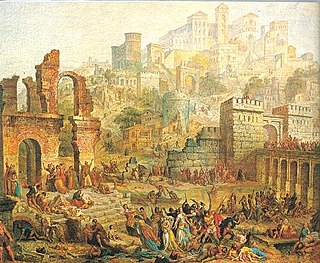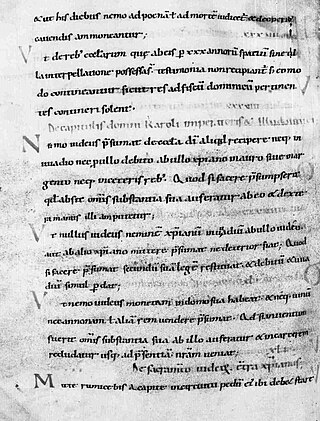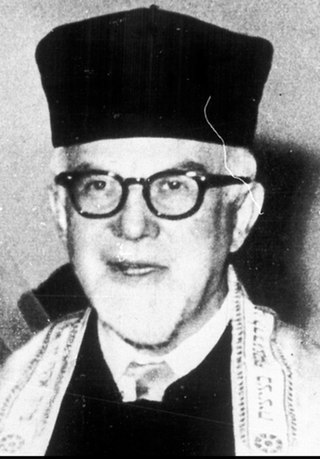Related Research Articles
Antisemitism is hostility to, prejudice towards, or discrimination against Jews. A person who holds such positions is called an antisemite. Antisemitism is considered to be a form of racism.

Ashkenazi Jews, also known as Ashkenazic Jews or Ashkenazim, are a Jewish diaspora population who coalesced in the Holy Roman Empire around the end of the first millennium CE. Their traditional diaspora language is Yiddish, which developed during the Middle Ages after they had moved from Germany and France into Northern Europe and Eastern Europe. For centuries, Ashkenazim in Europe used Hebrew only as a sacred language until the revival of Hebrew as a common language in 20th-century Israel.

Werner Sombart was a German economist, historian and sociologist the head of the "Youngest Historical School" and one of the leading Continental European social scientists during the first quarter of the 20th century. The term late capitalism is accredited to him. The concept of creative destruction associated with capitalism is also of his coinage. His magnum opus was Der moderne Kapitalismus. It was published in 3 volumes from 1902 through 1927. In Kapitalismus he described four stages in the development of capitalism from its earliest iteration as it evolved out of feudalism, which he called proto-capitalism to early, high and, finally, late capitalism —Spätkapitalismus— in the post World War I period.

Jewish emancipation was the process in various nations in Europe of eliminating Jewish disabilities, e.g. Jewish quotas, to which European Jews were then subject, and the recognition of Jews as entitled to equality and citizenship rights. It included efforts within the community to integrate into their societies as citizens. It occurred gradually between the late 18th century and the early 20th century.

The Rhineland massacres, also known as the German Crusade of 1096 or Gzerot Tatnó, were a series of mass murders of Jews perpetrated by mobs of French and German Christians of the People's Crusade in the year 1096, or 4856 according to the Hebrew calendar. These massacres are often seen as the first in a sequence of antisemitic events in Europe which culminated in the Holocaust.

Moritz Steinschneider was a Moravian bibliographer and Orientalist. He received his early instruction in Hebrew from his father, Jacob Steinschneider, who was not only an expert Talmudist, but was also well versed in secular science. The house of the elder Steinschneider was the rendezvous of a few progressive Hebraists, among whom was his brother-in-law, the physician and writer Gideon Brecher.

Peter Schäfer is a prolific German scholar of ancient religious studies, who has made contributions to the field of ancient Judaism and early Christianity through monographs, co-edited volumes, numerous articles, and his trademark synoptic editions. He was a Professor of Religion and the Ronald O. Perelman Professor of Judaic Studies at Princeton University from 1998 to 2013.

The Capitulary for the Jews is a set of six short legal prescriptions concerning Jews in the Carolingian Empire. They were gathered together and published under the title by which they are now known by Alfred Boretius in 1883, but only the first three and possibly the fourth are derived from a single source; the fifth and sixth are from an unrelated source. In one manuscript, the sixth "chapter" (capitulum) is said to have been taken "from Emperor Charles' statutes", indicating either Charlemagne or Charles the Bald. Its content, however, is inconsistent with the known Jewish policies of these emperors.

Moshe Zimmermann is an Israeli historian and writer. Since 1986 he has been director of the Richard Koebner Minerva Center for German History at the Hebrew University of Jerusalem.

Yitzhak Baer was a German-Israeli historian and an expert on medieval Spanish Jewish history.
Yitzhak Hen is Anna and Sam Lopin Professor of History, formerly at Ben-Gurion University of the Negev (Israel). Since August 2018 he has been the director of Israel Institute for Advanced Studies at the Hebrew University of Jerusalem.

Adolf Kober was a rabbi and a historian.
Heinz Schilling is a German historian.

Guy Gedalyah Stroumsa is an Israeli scholar of religion. He is Martin Buber Professor Emeritus of Comparative Religion at the Hebrew University of Jerusalem and Emeritus Professor of the Study of the Abrahamic Religions at the University of Oxford, where he is an Emeritus Fellow of Lady Margaret Hall. He is a Member of the Israel Academy of Sciences and Humanities.
Andreas Gotzmann is a German historian of Judaism and scholar of religion. He holds the Chair for Jewish Studies and Religious Studies at the University of Erfurt.

Shlomo Shafir (1924–2013) was an Israeli journalist and historian. His work included the underground Hebrew-language publication Nitzotz, circulated in the Kovno Ghetto and Dachau concentration camp; the Israeli Labor Party newspaper, Davar; and other Hebrew, German, and English language writings.
The Khazar hypothesis of Ashkenazi ancestry, often called the Khazar myth by its critics, is a largely abandoned historical hypothesis. The hypothesis postulated that Ashkenazi Jews were primarily, or to a large extent, descended from Khazars, a multi-ethnic conglomerate of mostly Turkic peoples who formed a semi-nomadic khanate in and around the northern and central Caucasus and the Pontic–Caspian steppe. The hypothesis also postulated that after collapse of the Khazar empire, the Khazars fled to Eastern Europe and made up a large part of the Jews there. The hypothesis draws on some medieval sources such as the Khazar Correspondence, according to which at some point in the 8th–9th centuries, a small number of Khazars were said by Judah Halevi and Abraham ibn Daud to have converted to Rabbinic Judaism. The scope of the conversion within the Khazar Khanate remains uncertain, but the evidence used to tie the Ashkenazi communities to the Khazars is meager and subject to conflicting interpretations.
Eliyahu Ashtor was an Austrian-Israeli historian He was from a Zionist family. Studying at Vienna University, he completed a doctorate in Oriental studies in 1936. He emigrated to Mandate Palestine in 1938, following the Anschluss to Nazi Germany, and worked in the National Libtary of the Hebrew University of Jerusalem. Completing another doctorate at Jerusalem University in 1944, he at first specialized on the history of the Golden age of Jewish culture in Spain but soon moved to the medieval history of the Near East, and especially social and economic history medieval Egypt, drawing from the manuscripts of the Cairo Geniza. He was professor at the University of Jerusalem from 1969.
Heiko Steuer is a German archaeologist, notable for his research into social and economic history in early Europe. He serves as co-editor of Germanische Altertumskunde Online.
The Armleder persecutions were a series of massacres against Jews in Franconia and Alsace in 1336–1339.
References
- 1 2 Michael Toch's website. Hebrew University of Jerusalem. Retrieved 30 November 2016.
- ↑ The Economic History of European Jews. Brill. Retrieved 30 November 2016.